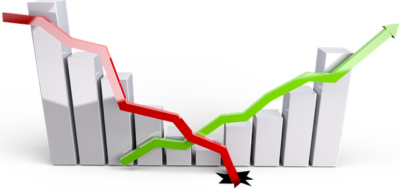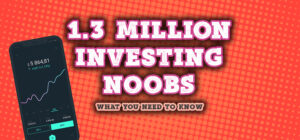
So, you’ve decided you want to invest in the Stock Market but don’t know where to begin? Well it couldn’t be simpler and here’s how….
There are multiple to ways to invest in the stock market. For example, you may want to buy shares directly the old way in which you get a share certificate or invest directly with a Fund. But we wouldn’t bother this way.
These days most people will invest using an Investment platform because it’s faster, cheaper, easier and offers more choice. This is the way we do it and you won’t go far wrong doing the same.
A platform will set up a nominee account and hold your shares and other investments on your behalf. You are still the legal owner of the shares, but your name will not appear on the company’s share register. No big deal as you still own them!

The steps to getting started:
Number 1 – Investment Platform
The order in which you choose to do the following can be debated but, in our opinion, you probably want to choose your Investment Platform first.
Some things to consider are the type of accounts they offer, their charges, available funds to choose from and quality of service. Search Google for Investment Platforms and compare their price structures and available funds to see which is best for you.
One thing to note is that they can have complicated pricing structures so the best platform for us might not necessarily be best for you, and depends on the amount to want to invest and how often.
Most good platforms will allow you to buy shares that are listed on a number of stock exchanges across the World such as the UK and USA so not finding a suitable investment is unlikely to be an issue.
Many platforms offer extensive research services but for us the Internet is full of free information anyway, so this service hasn’t really influenced our platform decisions – It’s just a nice little extra. Others may offer mobile apps or even old-fashioned telephone services.
For us though the most important decision are the fees. If you are going to follow the investment guidance on this site, then you can ignore the frequent trader buy and sell fees. The platform is trying to attract you with low frequent trader fees, but we encourage long-term investing.
So, the fees you do need to look out for are the cost of normal buying and selling and any annual or account charges. The platform Interactive Investor that Andy uses charges £120 a year but you also get £96 trading credit. This is a reasonable charge assuming you have a sizeable pot to invest.
If you have £1,000 invested, then the £120 fee is 12% of your pot, and so your pot is likely to shrink rather than grow. Do your research and aim to have the total charges per year to be as low a percentage as possible of your total pot size.
It’s worth planning for the future though, so if you’re investment pot is currently small but likely to grow quickly then this platform may suit you.

Number 2 – Decide on the Account Type
If you’re living in the UK your first port of call will probably be a Stocks & Shares ISA. This currently allows you to invest £20k per year. All returns will be tax free, which will really help your returns to skyrocket.
If you need to invest more than £20k, first use your ISA allowance and then after this you should consider a general investment account. The ISA is a no brainer as it stops the tax man from taking your hard earned money!
Number 3 – Direct ownership of shares or Pooled Funds
Buying individual shares yourself is more for sophisticated investors as you should do a lot of research and it is way riskier.
The way we would encourage a beginner or most people for that matter to invest is to use pooled funds. You invest in a fund, and the fund either makes all the investment decisions for you, or invests in an index.
Funds are often cheaper and offer a level of Diversification that simply cannot be achieved by investing directly in shares.

Number 4 – Managed or Tracker Funds
If you go down the Funds route then you need to make a choice of whether you go with a Managed Fund or a Tracker Fund (often called an Index Fund).
We personally rarely invest in Managed Funds as evidence suggests they don’t beat the market and you incur heavy charges. We invest a lot of our wealth in Tracker Funds, which as the name suggests attempt to track an index such as the FTSE 100 or S&P500.
We each started investing in the stock market using ETF’s tracking the FTSE 100 and other indices. These are tracker funds. We have also built up our investment pots to include many individual stocks – particularly large blue chips such as BP – as many pay juicy dividends. But in recent years we focus on ETF’s and trying to invest when the price is attractive.
What will you do?





2 Comments
A good article lots of useful information
Nice one thanks – this was back in the early days, our articles and video content are thankfully getting better now, anyone interest in starting out investing should start here:
https://moneyunshackled.com/2019/08/how-we-would-invest-1000-uk/
Comments are closed for this article!